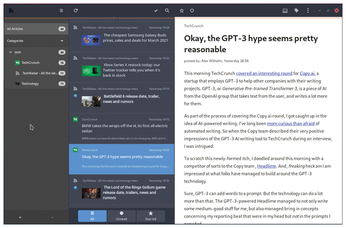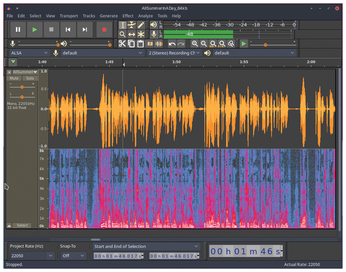FOSSPicks
NewsFlash
Remarkably, it's been eight years since Google closed its RSS Reader project. And yet, RSS survives and is more relevant now in the push information age than ever. Fortunately, there are still many websites that publish their own diminutive XML feeds containing brief synopses of their updates. Any RSS reader can then track and pull these updates, free of cookies and click-through advertising. Despite its age, RSS remains a refreshing alternative to the commercialization of the Internet, from sponsored newsletter placement and paid-for-tweets, to GIFs as non-fungible tokens (NFTs). Which is why it's brilliant to see another new RSS reader, NewsFlash, and a sign that RSS might be going through a small renaissance. NewsFlash is a new, small, and beautifully designed RSS reader that makes RSS feel more like an integrated part of a modern desktop, rather than something from a bygone era.
If you exported your Google Reader subscriptions to some RSS enclave, there's a good chance NewsFlash can use it. It will import your current RSS subscriptions from Feedly, Fever, NewsBlur, Feedbin, and Miniflux, as well as letting you add feeds yourself. The latter is made easier by an excellent integrated RSS browser that helps you to discover quality feeds from a categorized list. The modern Gnome design is perfectly suited to an RSS reader like this because the UI is both minimal and functional, with very little wasted space. The three column view first lists the categorized feeds you're subscribed to, and then an aggregated list of stories from the selected feeds or category, before the rightmost pane shows the contents for the selected item. It's perfectly augmented by titlebar icons to favorite an item, grab an attachment, and even scrape the full story, which is something you can't do with any other desktop toolkit and a great reason to choose NewsFlash whatever your desktop environment.
Project Website
https://gitlab.com/news-flash/news_flash_gtk

Audio editor
Audacity 3.0
It's a cliche, but Audacity really is one of those flagship open source applications that many people simply couldn't do their jobs without. It allows podcasters, community radio stations, and amateur musicians the world over to create serious, professional results without the serious outlay commercial applications often require, none of which work natively on Linux anyway (except BitWig!). Which is why, despite its modest set of new features, the release of Audacity 3.0 is still significant. We're simply grateful that the application continues to be developed, and we're particularly excited by the news that work is being undertaken to overhaul the outdated UI that has held it back from properly integrating with modern desktops, even if that isn't in this release. But this isn't a reason to discount version 3.0. In releases prior to this one, a project's AUP file only linked to the audio files, which means things could easily break if the AUP was lost or corrupted. Audacity 3 solves this problem.
A new .aup3 format embeds the metadata alongside the audio in a single file, allowing you to archive work and restore a session regardless of where you move the file or load it from. This has been accomplished by using a SQLite3 database internally to handle storage and retrieval, and it's much easier and even quicker to use than the old method. It's disappointing that you can't make the default save requester simply choose a WAV or MP3 file, but we do understand why it selects the internal format to save every parameter in a project. It's much like XCF being used by Gimp, but both projects are more likely to be used for quick import and export edits rather than prolonged projects. We think they'd both benefit by aligning the save requesters with what users expect.
Project Website

Buy this article as PDF
(incl. VAT)
